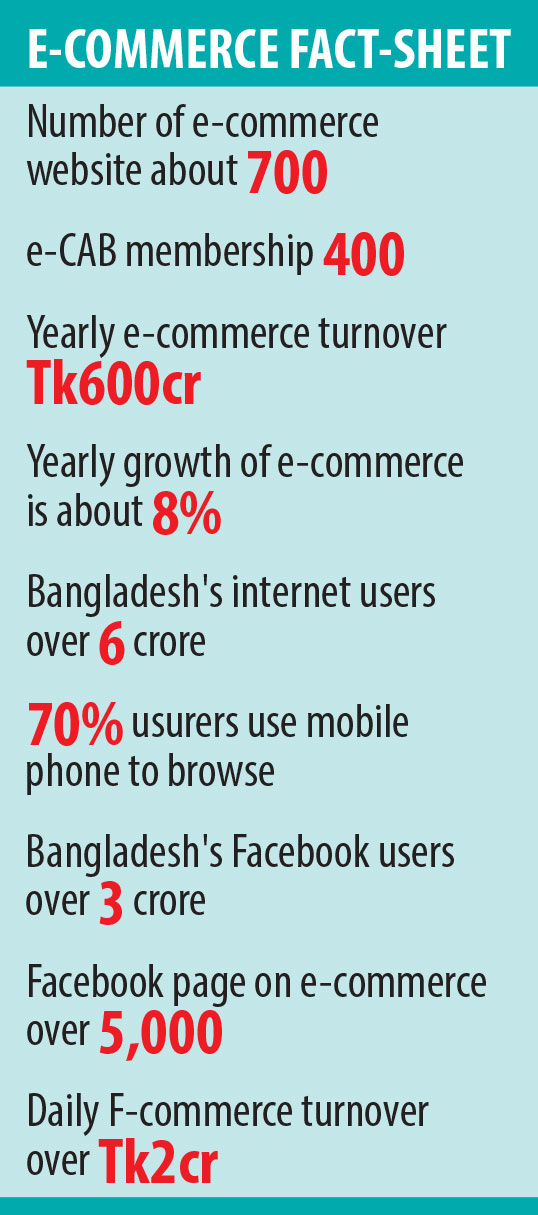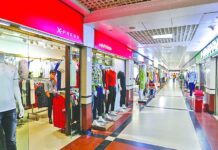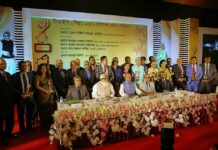Social media platforms not only play out as a mere means of communication all across the country, but also a platform for boosting e-commerce.
With the boon of technology and internet, the popular social media site – Facebook – is now reaching out to people living in the remote part of the country with the message of hassle-free online trading.
Apart form social networking, the FB has now come to live up to the desire of a large number of online buyers who now prefer to buy things of their choice, fighting shy of hustle and bustle at the crowded markets ahead of the greatest religious festival.
A Patuakhali trader Rafiqul Islam is one who tended to buy a Panjabi on the occasion of upcoming Eid ul-Fitr from a shopping mall in Dhaka.
But his time-consuming journey to the capital to satisfy his desire once yielded to the Facebook browser that helped him catch sight of a request to give a like to the page — Sada Kalo, a local fashion brand.
“After liking the page, I came across up-to-date trends on Eid collection on the page, and ultimately ended up in buying my desired Punjabi, sitting at home,” Rafiqul told the Dhaka Tribune.
The small trader is not the only man whose purchase desire was fulfilled with the help of social media and online payment gateway, many like him are shopping using e-commerce.
The online shopping is being taken to people’s doorsteps, even to the rural people ahead of Eid ul-Fitr, thanks to information technology.
“I have to work round the clock and have a little time to spend at shopping. Online shopping has created a new window for me as I can go through web pages and chose products,” Minhaz A Rahman,” an IT freelancer told the Dhaka Tribune.
He said he visits the web pages for frequent shopping, even those for groceries. Though earlier it was a little problem regarding payment, now it has turned easy, he added.
Social media and online payment gateway are playing an important role in taking e-commerce business to consumers, Md Abdul Wahed Tomal, general secretary of e-CAB, told the Dhaka Tribune.
There are about 5,000 Facebook pages, which run business of several items.
The online payment systems like bKash help expedite the business as buyers can send money from anywhere to their sellers, said Tomal.
In Bangladesh, local shoppers pay either on cash or through debit or credit cards or bKash service while the international shoppers make payment through paypal or payza.
According to e-CAB, there are abut 8,000 e-commerce websites in the country, of which 400 are the members of the platform.
Fashion houses are launching e-commerce and Facebook pages to attract consumers and retain their existing customers as the online business are booming.
“It is not possible for everyone to visit outlet to buy products due to distance and their business activities. Considering the consumers’ interest, Sada Kalo has launched an online buying subsystem and Facebook page to attract buyers,” Shafiqul Islam Sajib, senior in-charge of Bashundhara outlet, shared his view with the reporter.
Nowadays, it is very easy to find out the latest fashion and trendy products of brand shops as fashion houses put their new products on Facebook page to attract consumers, said Nusrat Amin, a private employee.
“If you look into the recent use of social media, you will find it is not only for communicating with friend but also for advertising products as young people are now 24 hours online,” said BASIS president Shameem Ahsan.
“We are promoting e-commerce through digital centre, an initiative of government to reach the service to people’s doorstep.”
According to a survey of LightCastle Partners (LCP) titled “The Rise of Digital Consumer Class in Bangladesh in 2015” the e-commerce is mostly driven by the female and young consumers, and 90% of them are residing in Dhaka.
The survey shows that 55% of the consumers are female while 40% are young professional and 33% are university students.
The most prevalent age group is 26-30 years old that accounts for half of the consumers.
The survey also shed light on payment system. According to the survey, 68% consumers pay cash on delivery, 20% through online payment getway, 7% mobile banking and 5% cash while picking up.
As per the findings of the survey, 22% e-commerce consumers buy fashion wear, 18% fashion accessories, 10% footwear, 9% jewelries, 15% electronics products, 10% food, 2% grocery, 6% personal care and 8% books.
Meanwhile, the E-commerce Association of Bangladesh (E-CAB) has urged the government to keep the e-commerce and online shopping out of taxation till 2024 to give it a push.
Source: Dhaka Tribune










